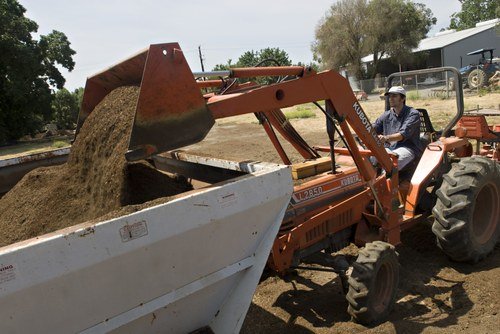Mechanized Farm Scale System
Our largest compost effort utilizes animal manure and bedding from UC Davis’ animal (sheep, dairy, and horse) facilities in a farm-scale turned-windrow system. The manure and bedding are piled into long windrows and turned with a tractor-driven compost turner 6 – 10 times over the course of several weeks. Typically water is occasionally added to keep the moisture content optimal. Turning mixes air and moisture throughout the pile and helps ensure that all of the compost is exposed to the elevated temperatures required for composts used in organic production. Most of the finished compost is applied to the planting beds in the Market Garden; some is used as part of our seed-flat planting mix or is available for other uses on the Farm.
Most of this compost is made during the summer and the opportunity for of an interested intern to complete a special project in this area is open to those students desiring a better understanding of larger scale compost production.
Garden Scale System
The Ecological Garden uses year-round garden scale composting systems such as a three-bin aerobic system and a vermicomposting bin system. The compost from these systems is then applied to the planting beds throughout the Ecological Garden. Students working in these systems can include general Ecological Garden interns and volunteers and may include students who wish to complete internships focused on these systems.
Project Compost
The Student Farm also collaborates with Project Compost, a year-round, student-run program that collects diverse organic wastes from various locations on campus and composts them at the Student Farm. In addition to space, we provide Project Compost with training and use of our tractors and compost turner, which they use in turning their compost windrows.
Learn more about internships and volunteer opportunities here.